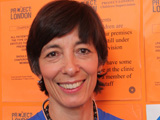 The BMJ has chosen Doctors of the World for this year’s Christmas charity appeal. Paquita de Zulueta has worked for the past four years as a clinical volunteer at Doctors of the World’s clinic in London’s East End, helping to provide a one-stop service for vulnerable people who cannot access primary care.
The BMJ has chosen Doctors of the World for this year’s Christmas charity appeal. Paquita de Zulueta has worked for the past four years as a clinical volunteer at Doctors of the World’s clinic in London’s East End, helping to provide a one-stop service for vulnerable people who cannot access primary care.
Those we help at the clinic—including undocumented migrants, refugees, and homeless people—are not the aliens demonised in the right wing press, but human beings often forced out of their country who only hope for a chance to rebuild their lives.
Many of them are hardworking professionals like you and me. Their quiet dignity and gratitude is humbling. How do they manage? They sleep on friends’ sofas, if they are lucky, or in churches or bus stations (or even on buses). Some have been tricked and trafficked into sexual or domestic slavery, including children. Many want to go back to their country of origin, to be reunited with their families, but they are unable to do so as they risk persecution or death.
Most of them yearn to work, to contribute to society and to regain their dignity as law-abiding, tax-paying citizens. Research by Doctors of the World’s clinic found that service users had, on average, been living in the UK for three years before they tried to access healthcare and only 1.6% came to the UK for health related reasons.
The clinical problems they present are various—some relatively trivial, such as painful feet or a sore throat, some potentially life threatening. But even painful feet are no joke if you’re forced to walk the streets in search of somewhere safe to sleep, or for a half-decent meal. Many suffer, unsurprisingly, with mental health problems including post traumatic stress and severe depression. I have seen patients with untreated heart failure, diabetes, and advanced cancer.
One woman still haunts me. She came to us, having been sent away from the hospital with a week’s supply of oral morphine. Her breast cancer had been untreated, as the money she had come to the UK with on a medical visa had run out after she’d undergone several investigations and a Caesarean section before term. She was in pain and desperate, her arm and neck grotesquely swollen, fluid in her chest, her breasts like wood. She was too ill to travel and could not leave her baby (then in the special care baby unit). Fortunately, with the help of a kind lawyer, we managed to get the hospital to take her back and treat her. All she needed was Tamoxifen to be well enough to travel back home with her baby.
Many service users have been too frightened to seek help. They will be even more so now if proposed measures to restrict access to healthcare for migrants are given the go ahead by the government. Making it harder for people to access primary care will cost more to the health system as patients increasingly will have to pitch up at A&E and it is also creates more of a risk for public health generally.
Is it our duty to be border agents or to treat those in clinical need? Of course we need sensible immigration policies and we should claim back from those who can and should pay, but we are a rich and supposedly civilised nation and can care for the vulnerable whose grim choice may be deportation (and possible death) or destitution.
I realise that life is hard at present in general practice and hospital medicine. But I also do believe that this is the time to really ask ourselves: what are our core values and how can we best enact them? By showing generosity and compassion, we can retain our professionalism and humanity, and be a bulwark against the bureaucratisation and dehumanisation that we are witnessing in modern healthcare.
The BMJ has chosen Doctors of the World for this year’s Christmas charity appeal. Please support the appeal by donating:
Online at: www.doctorsoftheworld.org.uk/BMJ
By text message: text DOCTOR to 70030 (for UK mobile networks only. £10 donation)*
By phone: 02035357955
By cheque: please make cheque’s payable to Doctors of the World UK and send to: BMJ Appeal, Doctors of the World UK, One Canada Square, London, E14 5AA.
Patient consent obtained.
Paquita de Zulueta is a sessional GP working as a volunteer in Doctor of the World’s clinic in Bethnal Green, London. She is also honorary senior clinical lecturer at Imperial College.
*You will be charged £10, plus one message at your standard network rate. A minimum of £9.94 depending on your service provider, will be received by Doctors of the World UK, Registered Charity No: 1067406. If you have any questions please call 020 7167 5789.
